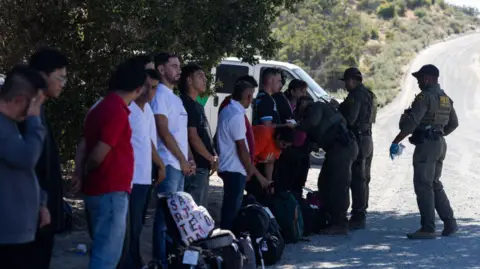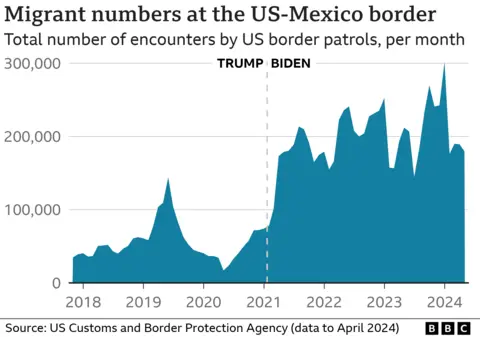Bernd Debusmann Jr,BBC News, Washington
 Getty Images
Getty ImagesPresident Joe Biden is expected to issue a sweeping new executive order aimed at curbing migrant arrivals at the US-Mexico border as early as Tuesday.
Under the planned order, US officials could swiftly deport migrants who enter the US illegally without processing their asylum requests once a daily threshold is met, according to CBS.
That, in turn, will allow border officials to limit the amount of migrant arrivals, three unnamed sources briefed on the expected order told CBS, the BBC’s news partner.
More than 6.4 million migrants have been stopped crossing into the US illegally during Joe Biden’s administration – a record high that has left him politically vulnerable as he campaigns for re-election.
Migrant arrivals have plummeted this year, however, although experts believe the trend is not likely to be sustainable.
CBS – the BBC’s US partner – and other US news outlets have reported that Mr Biden has been mulling use of a 1952 law that allows access to the American asylum system to be restricted.
The law, known as 212(f), allows the US president to “suspend the entry” of foreigners if their arrival is “detrimental to the interests” of the country.
The same regulation was used by the Trump administration to ban immigration and travel from several predominantly Muslim countries and to bar migrants from asylum if they were apprehended crossing into the US illegally, provoking accusations of racism.

Asylum processing at ports of entry is expected to continue under the order. About 1,500 asylum seekers go through the process at official crossings each day, mostly after setting up appointments using a Customs and Border Protection (CBP) app known as CBP One.
Mayors of several border towns – including Brownsville and Edinburg, both in Texas – were expected to be in Washington for the president’s announcement.
Democratic lawmakers have also been reportedly briefed on the plan.
The proposal, however, is likely to be challenged in court, either from immigration advocates or from Republican-led states.
A White House official told the BBC on Friday that no final decisions had been made on possible executive actions.
In a statement, a White House spokesperson noted that a bipartisan border security deal failed earlier this year as a result of opposition from Republicans in Congress.
“While Congressional Republicans chose to stand in the way of additional border enforcement, President Biden will not stop fighting to deliver the resources that border and immigrational personnel need to secure our border,” the spokesperson said.
“As we have said before, the administration continues to explore a series of policy options and we remain committed to taking action to address our broken immigration system,” the spokesperson added.
Republicans criticised the Biden border plan as an election-year ruse and argued that US laws already exist to prevent illegal immigration, but they were not being duly enforced by the Democratic president.
News of the potential executive order comes as numbers of migrant detentions at the US-Mexico border fall.
Recently released statistics from CBP show that about 179,000 migrant “encounters” were recorded in April.
In December, by comparison, the figure spiked to 302,000 – a historic high.
Officials in the US and Mexico have said that increased enforcement by Mexican authorities is largely responsible, although many experts have cautioned the reductions are unlikely to be permanent.
The decline in migrant crossings at the US border comes at a politically fraught time for President Biden.
Polls show that immigration is a primary electoral concern for many voters in the presidential election in November.
A Gallup poll at the end of April found that 27% of Americans view immigration as the most important issue facing the country, topping the economy and inflation.
A separate poll conducted in March by the Associated Press and NORC Center for Public Affairs Research found that two-thirds of Americans now disapprove of Mr Biden’s handling of the border, including about 40% of Democrat voters.


